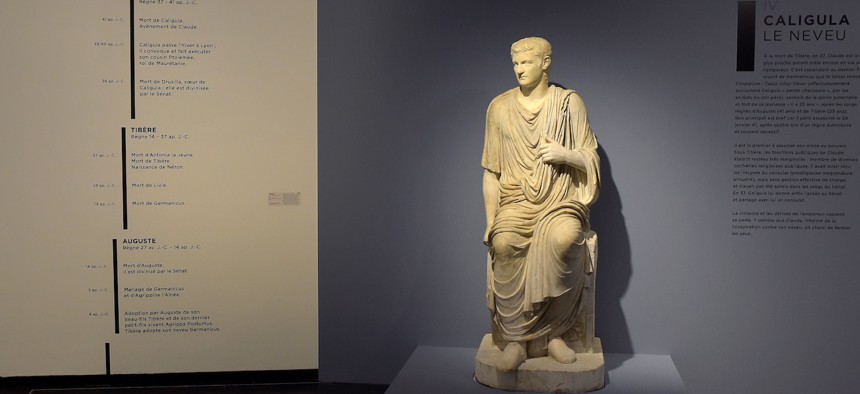
A statue of the Roman Emperor Caligula, on display during an exhibition about the Emperor Claude in November 2018 at the Beaux-Arts Museum in Lyon, France. ROMAIN LAFABREGUE/AFP via Getty Images
10 surprising things about the ‘deep state’—starting with the Roman Emperor Caligula
COMMENTARY | There are basic truths that never go away, a former dean at the University of Maryland School of Public Policy explains.
There’s been a tsunami of debate about the “deep state” and its risks to government. But behind the raucous debate is a collection of surprises that help shine a bright light on what the deep state is really all about.
In a 68-page tour through the issue since ancient times, I poke into the big and enduring themes in Experts in Government. The most important is that no government can last without expertise—but the quest for expertise inevitably brings problems of control. And, on the other hand, seeking control of experts tends to undermine their ability to bring government the expertise it needs.
There are 10 big and surprising things lurking in the shadows of this debate.
- The personal loyalty of experts isn’t all it’s cracked up to be—just ask Caligula. The Roman emperor surrounded himself with a handpicked Praetorian guard to keep him safe. In 41 CE, however, elite members of the guard knifed him in a corridor of what was the White House of its day. Counting on the fealty of even the closest experts isn’t always a good bet.
- Ancient Chinese emperors discovered they couldn’t rule effectively without nonpartisan experts. Long before Caligula met his end, the emperors established a civil service filled with experts who had passed an incredibly rigorous exam. Researchers have called it the “examination system from hell” which included, among other things, memorizing 400,000 characters of Confucian text. Cheating on the exam was discouraged. Anyone caught looking on the paper of the person sitting nearby was executed.
- The Chinese emperor Wudi created the world’s first school of public policy. It was impossible to get the experts the empire needed without training them. In 124 BCE, Wudi created an imperial university to educate bureaucrats, which was likely the world’s first school devoted to professional training. There’s no record of whether the curriculum included employee engagement, performance measurement, and cross-organizational skills development.
- The Chinese reverence for experts grew over the centuries. In fact, society held university professors in especially high regard because of their expertise. Litter-bearers carried them to meetings in sedan chairs. I’m proposing bringing back that tradition, at least for former deans.
- The Romans knew how to do public law. The expertise of Roman bureaucrats endures today, from the Coliseum to aqueducts that still work. Over such a far-flung empire, however, there needed to be a system to create order, both in defining the role of the state and ways of resolving disputes among individuals. The emperor Justinian relied on his legal experts, led by the Greek Tribonian, to put together a Roman code of law in the sixth century. Modern bureaucrats didn’t invent red tape—Justinian’s code had more than a million words.
- Count on the deep state to preserve the rule of law. No one really knows why, but Justinian’s massive effort disappeared for hundreds of years during the Dark Ages. But thanks to the work of monks who kept the tradition alive, the principle of the rule of law endured. In the eleventh century, Justinian’s code was rediscovered, and a monk named Gratian led an impressive effort to pull the Roman code into the not-so-Dark Ages, to weave it into the church’s canon law, and to lay the foundation for the rule of law governing modern experts.
- Blame Johannes for bureaucrats’ push-back against their leaders. It’s really Johan’s fault—Johannes Gutenberg, that is. His invention of printing with movable type made it much easier to spread expertise broadly, compared with painstakingly copying how-to guides by hand, which inevitably made expertise closely held. That contraption democratized expertise and, in turn, made it much easier to contest central authority.
- When it comes to the “deep state,” don’t look to America’s founders for clues. As anyone who has seen the musical Hamilton knows, the founders didn’t spend a lot of time trying to figure out how to set up a bureaucracy or how to make it accountable. That makes it a lot easier to quote the founders in saying almost anything to back up almost any claim about bureaucratic power and the deep state. That makes it easy, in turn, to pick fights about the “deep state” without having to worry about first principles in American government. Except accountability. More on that shortly.
- Britain’s taste for tea is responsible for the American civil service. Thanks to the growing taste of the British for the caffeinated beverage, the English East Trading Company became a corporate behemoth whose size and power worried leaders like William Pitt the Younger. Two experts, Stafford H. Northcote and C.E. Trevelyan, wrote a report in 1854 that urged the creation of a professional civil service, based on very Chinese principles like competition for government positions through exams and appointment to positions based on merit. They proposed increasing government’s expertise so it could properly regulate the private sector, especially the trade in tea and spices. Their report laid the foundation for the creation of the American civil service system thirty years later. It did not, however, resolve the eternal British dispute about whether to add cream to the cup before or after the tea.
- The rise of the American civil service and the merit system sought to end piracy in government. The American political scientist Paul van Riper hailed the rise of the merit system in forcing “an orderly retreat of parties from their prerogatives of plunder.” Swapping government officials with every election turned out to be pretty bad government. The government didn’t have the expertise it needed to govern well. It weakened its capacity to balance other major forces in society. And it fed endless temptations for corruption. The pressures from office seekers, in fact, had been so bad with every transition in power that Abraham Lincoln risked the dangers of traveling to the still-smoldering Richmond battlefield in 1865 rather than put up with the people wanting jobs in those pre-merit system days, as Tom Shoop explains.
On his way to Richmond, Lincoln told the tale of one office-seeker who asked to be named as a minister abroad. When that request failed, he countered by requesting a position as a customs officer, which was one of the most popular patronage positions available (along with local postmasters). “When he saw he could not get that,” Lincoln said, “he asked me for an old pair of trousers.”
So what does this 2,000-year tour through the role of experts in government reveal? There are basic truths that never go away:
- Personal loyalty is no substitute for administrative competence in securing good government.
- Accountability to the policies of individual leaders undermines the long-term competence of government, weakens the ability of leaders to secure their policy goals, and risks having power slide into the hands of private institutions that are not accountable to the people at all.
- The merit system is the best safeguard for the rule of law—and vice versa.
- Government without a strong merit system is messy for everyone, starting even with leaders who might have thought it was a good idea.
Donald F. Kettl is professor emeritus and former dean at the University of Maryland School of Public Policy. Experts in Government: The Deep State from Caligula to Trump and Beyond, can be downloaded for free for a limited time.







